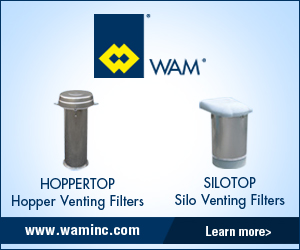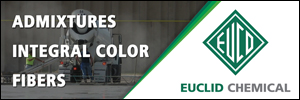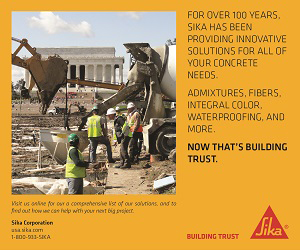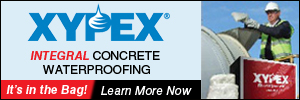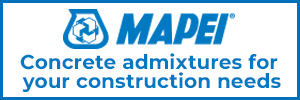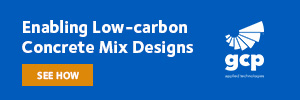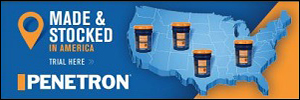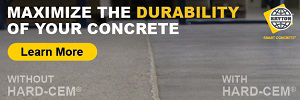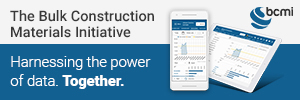 |
||||||||||||
|
||||||||||||
NRMCA is now accepting entries for its 2022 Kids Art Contest, sponsored by the Truck Mixer Manufacturers Bureau. The theme for the contest is My Kind of Concrete! The contest is open to children up to grade 12 who have a relationship to an NRMCA member.
Entries will be divided among the following grade categories: pre-K-K; 1-3, 4-6 and 7-12. First, second and third place winners will be selected from each grade category. Prizes will be awarded in each grade category ($100 first; $50 second and $25 third place). Entries will be judged only against others in their grade category. They will be judged on originality, effort, creativity, composition and interpretation of the theme My Kind of Concrete. Winners in each category will be announced at NRMCA’s 2022 Annual Convention to be held in March in San Antonio, TX. Images of the winning entries will be used later in the year to create a 2023 NRMCA calendar and winners and the sponsoring members will receive a free copy of the calendar. Selected entries will be displayed at NRMCA’s Annual Convention. NRMCA reserves the right to copy and modify any entry for reproduction. Entries will not be returned and may be used for future promotional opportunities. Entries must be postmarked no later than December 31 and should be mailed or delivered to Taylor Drzewicki, NRMCA 66 Canal Center Plaza, Suite 250, Alexandria, VA 22314. For more information please contact Taylor Drzewicki at tdrzewicki@nrmca.org. Engineering
The American Concrete Institute's Fall Convention was held virtually from October 16 - 21; NRMCA Engineering Staff summarized relevant committee activity as follows: 122 - Energy Efficiency of Concrete and Masonry Systems – The committee is progressing with development of three new standards. One standard will provide guidance on dealing with thermal bridges in concrete and masonry structures. This standard has been approved for publication and is being proposed for inclusion in the International Energy Conservation Code. The other two standards provide the quantitative information required to model concrete and masonry building envelope components for use in building energy models for residential and commercial buildings and are in the review process. Scott Campbell maintains representation on ACI 122. 201 – Durability – The committee is revising the guide to durable concrete, 201.2R. Chapter 9 on Corrosion is being updated with discussions on proposing modifications to ACI 318 exposure classes and concrete requirements that includes prescriptive and alternative performance requirements. The guide will also address Microbial Induced Corrosion (MIC) of Concrete. The committee is balloting a Tech Note (TN) on iron sulfide minerals in aggregate, specifically Pyrrhotite. A new document on alkali aggregate reactions is being developed jointly with Committee 221 on Aggregates. A session on Pyrrhotite is planned for the April 2022 convention. Karthik Obla maintains representation in ACI 201. 211 – Mixture Proportioning – The committee is addressing TAC comments (ACI review process) to its primary document on mixture proportioning (ACI 211.1). A document on developing 3-point curves for trial batches is being reworked. Task groups are addressing comments received on the new ballot on assessing aggregate gradations. A task group is working on a new report on aggregate packing models. Karthik Obla maintains representation on ACI 211. 214 – Strength Tests – The committee will not develop a Tech Note on using two instead of three 4x8 in. cylinders for acceptance testing since there is a change proposal regarding this in ACI 318. The committee is finalizing Tech Notes on cylinder vs cube strengths and to establish guidance on establishing required average strength for different risk levels relative to the ACI acceptance criteria. The committee will develop a new TN on “When a test specimen result can be discarded”; a new report on developing acceptance criteria based on statistical concepts for specified tests other than strength, such as for flexural strength, modulus of elasticity, RCP, resistivity, and w/cm measured using the microwave oven. The 214R document is being revised; the basis for modification factors for standard deviation based on less than 30 tests will be outlined. The committee will propose a definition for strength over-design. Karthik Obla maintains representation on ACI 214. 216 – Fire Resistance and Fire Protection of Structures – The ACI 216 Committee continues to finalize the revised edition of ACI 216.1, Code Requirements for Determining Fire Resistance of Concrete and Masonry Construction Assemblies. This updated edition of the standard will include a new chapter on loads in fire addressing strength reduction factors, load factors and load combinations. Additionally, the committee is finalizing the new rational design guide on determining fire resistance. The document will provide guidelines for determining fire resistance through analytical methods in addition to the existing prescriptive methods. The technical committee has also developed a new chapter on post-fire assessment and repair in ACI 562, Code Requirements for Assessment, Repair, and Rehabilitation of Existing Concrete Structures. Shamim Rashid-Sumar maintains representation on ACI 216. 232 – Fly Ash – The committee is finalizing its response to TAC comments to finalize the TN on potential use of harvested fly ash from impoundments. Future sessions are planned on the use of bottom ash as an SCM. There was an update on the various research projects addressing fly ash supply. Karthik Obla maintains representation on ACI 232. 301 – Specifications for Structural Concrete – The subcommittee responsible for Section 4 on Concrete Mixtures is working on a significant reorganization to consolidate and categorize submittals and other revisions that have been identified. The subcommittee responsible for post tensioned systems in Section 9 will separate provisions for bonded and unbonded PT construction. The committee sponsored two sessions where the changes to 301-20 from the previous versions were summarized by the subcommittee chairs. Recordings of these sessions will be available on the ACI website. The committee is working on a revision to the ACI 301 specification to be published after 2025. Colin Lobo maintains representation on ACI 301. 318 – Building Code for Structural Concrete – ACI Subcommittee A on Concrete Materials is working on several code change proposals. Approved items include a reference to specification for ground glass pozzolans, a requirement to verify consolidation in ICF construction and clarification on chlorides in admixtures for prestressed concrete. Other change proposals in progress include the ability to use two 4x8 in. cylinders for a strength test, addressing criteria for field cured specimens for post tensioning and formwork, including additional requirements for hot and cold weather concreting; enhancing requirements for curing; permitting the designer to exempt the limits on SCMs for exposure class F3; revising chloride exposure class to include air-borne chlorides for structures close to the ocean; the acceptance process for density of lightweight concrete to include a performance requirement based on ASTM C1202 instead of a limit on w/cm and several other changes. Frank Malits takes over as chair of 318A from Terry Holland who served as chair for several years. Subcommittee N on Sustainability is finalizing a new appendix on sustainability to ballot at the main committee. The appendix is not mandatory but can be used by the designer if there is a sustainability goal on a project. The appendix includes structural system sustainability, concrete materials for reduced environmental impact and system resilience. Colin Lobo maintains representation on subcommittees A and N and on the 318 main committee. 321 – Concrete Durability Code – ACI 321 is a new committee formed last year to develop a code for durability. The committee has developed more detailed exposure classes than currently defined in ACI 318 and is working to finalize these before establishing requirements for concrete. Requirements for concrete will include both prescriptive and performance alternatives. This code could be referenced for structures beyond buildings that is covered by ACI 318. 325 – Concrete Pavements – The committee currently has four documents under development or revision. The committee is rewriting ACI 325.12R-02 (Reapproved 2014), Guide for Design of Jointed Concrete Pavements for Streets and Local Roads led by Brian Killingsworth. Revisions to this document have been completed and are currently being balloted. The committee is developing ACI 325, YR Report on Precast Concrete Pavements - State of the Practice, which is based upon work completed by Tayabji for SHRP2. Work is also underway to update ACI 325.ZR, Design and Construction of Continuously Reinforced Concrete Pavements. This work will continue over the next year. ACI 325.13R-06, Concrete Overlays for Pavement Rehabilitation, has also been updated and will be balloted this winter. Killingsworth will ensure that considerations for streets and local roads will be included in all documents. Brian Killingsworth maintains representation on ACI 325 on Concrete Pavements. 329 – Performance Criteria for Ready Mixed Concrete – The committee did not meet but has different sections for a guide performance specification in progress. Karthik Obla and Colin Lobo maintain representation on ACI 329. 330 – Parking Lots – The committee is addressing comments from the ACI review process on the 330.1 specification. The committee is working on addressing construction tolerances. Amanda Hult maintains representation in ACI 330. 332 – Residential Concrete – The research funded by the Ready Mixed Concrete Research & Education Foundation at the University of Washington was presented to the above grade wall subcommittee. A proposal for development of three ACI Tech Notes demonstrating the use of less reinforcement in concrete walls was presented and the committee is conducting an online ballot regarding moving forward with that development. Scott Campbell maintains representation on ACI 332. 380 – Plain Concrete – A proposal for development of three ACI Tech Notes demonstrating the use of less reinforcement in concrete walls was presented and the committee voted to move forward with that development. Scott Campbell maintains representation on ACI 380. 522 – Pervious Concrete – The committee continues to address TAC comments on the 522R guide document. Amanda Hult maintains representation in ACI 522. 555 – Recycled Materials – ACI’s TAC has advised the committee to split the existing document into three reports: removal of hardened concrete, reuse of hardened concrete and unbound recycled concrete applications. The committee continues to work on these documents. Karthik Obla maintains representation in ACI 555. 560 – ICF Buildings – A technical mini-session with excellent attendance was presented during the committee meeting by Scott Campbell and Micah Garret. The committee has finalized its guide document update of example problems and is working through the approval process. A proposal for development of three ACI Tech Notes demonstrating the use of less reinforcement in concrete walls was presented and the committee voted to move forward with that development. An update on relevant code changes from the 2021 ICC hearings was presented. Scott Campbell and Shamim Rashid-Sumar maintain representation on ACI 560. Concrete Research Council (CRC) – The Research Council of the ACI Foundation funded eight research projects – four in materials and four in structural design – in its 2021 cycle. The council discussed sources of funding for the 2022 cycle and it is likely the same number will be selected at the same funding level of $50,000 each. Research proposals will be solicited soon. The committee finalized its selection of recipients for the 2022 Robert E. Philleo and Boase awards to be presented at the next ACI Convention. Colin Lobo maintains representation on ACI CRC. For more information, contact the relevant NRMCA staff member listed at the end of each committee report. SEO
NRMCA's Ready Mixed Concrete Delivery Professional Driver of the Year Award, now in its 26th year and sponsored by the Truck Mixer Manufacturers Bureau (TMMB), acknowledges the significant contribution of ready mixed concrete truck drivers to the growth and success of individual companies and the ready mixed concrete industry. As a salute to these key members of the concrete production and delivery team, the award recognizes the driver’s career achievement, safety, professionalism, competence and customer service skills in a manner that will enhance the industry and public image of the career of Ready Mixed Concrete Delivery Professional. The 2022 Ready Mixed Concrete Truck Driver of the Year Award winner will be honored at an awards presentation ceremony at NRMCA’s Annual Convention in San Antonio, TX, in March 2022. Applications must be e-mailed to DOY@nrmca.org by Friday, December 31. Government Affairs
With the unravelling of the planned infrastructure vote in late September, Congress has passed a short-term extension of federal highway programs, which now expires on October 31. The infrastructure package, which has been passed by the Senate and is awaiting a vote in the House, has been immobilized by the inability of Democrats – House, Senate and White House – to agree on a framework for the social spending plan they are pursuing through reconciliation. Speaker Pelosi has indicated that Democrats are “pretty much there” and Sen. Manchin has expressed hopes that an agreement on the framework could be reached this week. The president is anxious to see progress on both the Build Back Better reconciliation package and the infrastructure package before he leaves the country for a climate summit in Scotland. The unexpectedly tight Virginia governor’s race is putting additional political pressure on the administration and Congressional leadership to show that Democrats can deliver on key components of President Biden’s agenda. NRMCA and our coalition partners continue to advocate with key Members of Congress and staff, coordinating our efforts and collaborating to leverage relationships and district presence. As part of this effort, the coalition, lead by the US Chamber of Commerce and the Transportation Construction Coalition, released a new digital ad this week underscoring the importance of the infrastructure investment. The ad comes on the heels of radio ads released last week targeting key Congressional districts and urging support for the Infrastructure Investment and Jobs Act. For more information, contact Andrew Tyrrell at atyrrell@nrmca.org. As Congress and the Biden Administration continue discussions of proposals to institute bank account reporting, NRMCA and our coalition allies have repeatedly voiced our opposition to the proposed policy. The bank reporting policy proposes to require providers of financial services to track and submit to the IRS information on the inflows and outflows of every account above a $10,000 threshold, raised from the initial proposal of a $600 threshold. Earlier this month, NRMCA joined our business advocacy partners in letters to Congress (here) and the White House (here) expressing our continued opposition to the proposed policy. These letters follow up on advocacy from NRMCA and allied groups expressing concerns and opposition to the policy in July. The proposal has attracted significant opposition from the business community as it has the potential for false-flag collection of small business banking as small businesses, including ready mixed concrete producers, may frequently move money between accounts to meet the needs of business operations. NRMCA will continue to oppose legislation and regulation that could negatively impact ready mixed concrete producers. For more information, contact Andrew Tyrrell at atyrrell@nrmca.org. Pavement
The Florida Concrete & Products Association (FC&PA) recently released the Florida Rigid Pavement Streets & Local Roads Design Guide; this first-ever industry resource provides the state's counties and cities with in-depth instruction and best practices for the design, construction and maintenance of concrete pavement for lower volume street and road paving projects. “Concrete roads made with a suitable design and sound construction practices can lead to long-term environmental and financial benefits for Florida,” said FC&PA President Matt Sitter. “This comprehensive guide takes practitioners through this design process to ensure their next road paving project can achieve these goals.” Highlights of the design process covered in the material include:
The design principles laid out in the guide are based on the industry’s innovative web-based tool, www.PavementDesigner.org. This user-friendly tool, accessible through the guide, simplifies the design process by eliminating the need to perform multiple computer reiterations and analyzing the results to determine a feasible design. Information in the guide is also supported by links to instructional and technical industry reference materials. The Florida Rigid Pavement Streets & Local Roads Design Guide was created in partnership with FC&PA, NRMCA, the American Concrete Paving Association and the Portland Cement Association. You may download a copy of the guide here and a recent presentation on the guide here. If you have any questions, contact Amanda Hult at ahult@nrmca.org or FC&PA’s Amy Wedel at awedel@fcpa.org. NRMCA Senior Vice President, Local Paving, Phil Kresge recently joined Maryland Ready Mix Concrete Association (MRMCA) Executive Director Tom Evans in exhibiting at the Roadway Management Conference in Rehoboth Beach, DE. The focus of the exhibit was concrete overlays and full depth reclamation (FDR). “Our intent was to let folks know that concrete overlays and FDR are both viable, affordable maintenance alternatives,” says Kresge. Hosted by the Mid-Atlantic Region Local Technical Assistance Programs and Technology Transfer (LTAP/T2) Centers, the conference brought together roadway practitioners who design, construct and maintain state, county and municipal roads and streets. The conference is designed to help these practitioners prepare for and successfully address public works transportation challenges using proven and innovative methods. In addition to the exhibit booth, the concrete industry was also represented by American Concrete Pavement Association (ACPA) Director of Technical Services Eric Ferebee who gave his presentation, Cement Based Integrated Pavement Solutions, with specific focus on both FDR and pervious concrete pavement. For more information, contact Phil Kresge at pkresge@nrmca.org. An innovative idea from a community activist has led to the creation of the longest glow in the dark concrete trail in the U.S. The two mile concrete trail in Vinton, IA, is imbedded with a special aggregate that with only 15 minutes of sunlight “charging” will emit light for 15 hours. Click here for more information and here to view some construction footage posted by the engineering firm that designed the trail. For more information about concrete trails or to receive a free copy of the Guide to Concrete Trails, contact Jon Hansen at jhansen@nrmca.org. 2022 February 8 - 11, Phoenix February 15 - 17, Dallas February 15 - 17, Online Course February 22 – 24, Smyrna, TN March 22 - 24, Smyrna, TN April 5 - 7, Dallas April 19 - 21, Smyrna, TN September 29 - October 3, Aurora, CO Calendar
Please note that e-mail and direct links to each event listed below can be accessed from NRMCA's Web site. November 5 - 16, Online Course November 9 - 11, Dallas *Sold Out November 10, Mesa, AZ November 17, Free Virtual Conference November 30 - December 2, Orlando, FL December 6 - 9, Online Course December 7 - 10, Orlando, FL December 15, Free Virtual Conference |
||||||||||||
